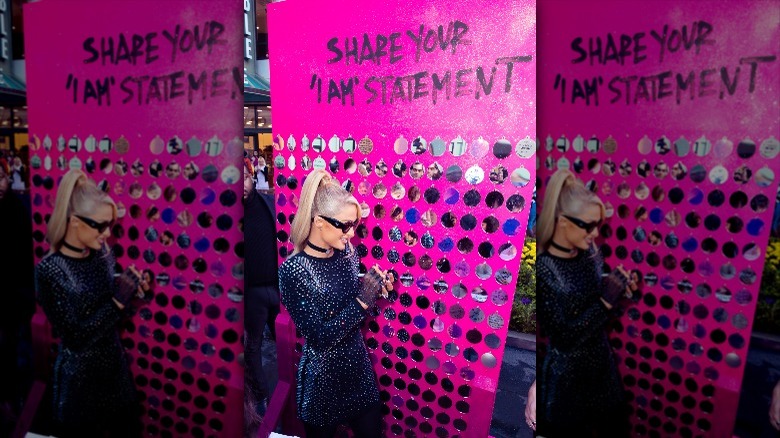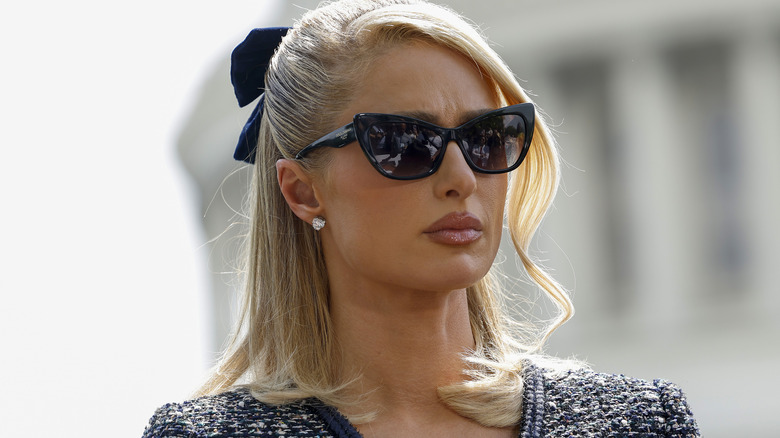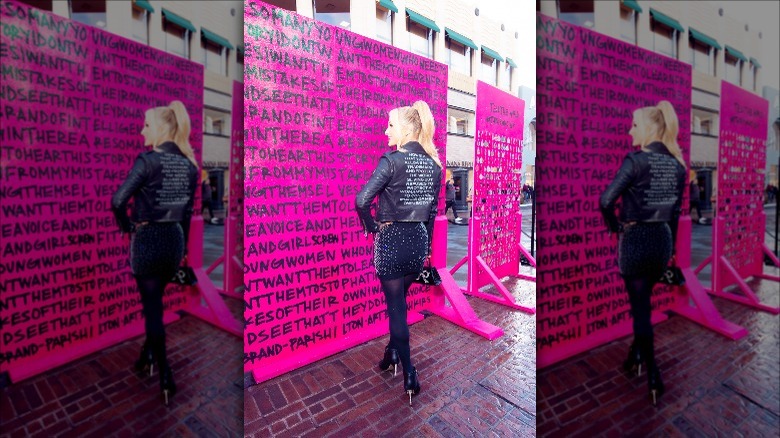Paris Hilton Tells Her Truth With The Empowering #THISISWHOIAM Campaign - Exclusive Interview
Paris Hilton is a woman who doesn't need an introduction — the socialite and hotel heiress was a fashion icon in the 2000s and starred in the popular reality TV show called "The Simple Life." However, there's much more than meets the eye when it comes to Hilton's identity, which is why she is now reintroducing herself to the world on her own terms.
Recently, Hilton wrote about her life experiences in her namesake memoir called "Paris: The Memoir." In her book, she talks about the trauma she endured as a student at Provo Canyon School and the struggles she faced throughout her life — from managing ADHD to navigating a media landscape that objectified her. Having seen how her story resonated with so many people, Hilton has now started a social media initiative where she is encouraging others to share their stories through a quick social video statement, using #THISISWHOIAM.
Many of her celebrity peers, such as Drew Barrymore, have shared their #THISISWHOIAM statements on social media, and now you can as well. All you have to do is film a 15-second video stating who you are and upload it to social media with #THISISWHOIAM in the caption. Through Paris Hilton's partnership with TSX Entertainment, some of the videos that people sent to the TSX app were even displayed in Times Square earlier this month. In an exclusive interview with The List, Hilton spoke to us about how she is currently using her platform to advocate for stronger regulations around for-profit residential centers for children and why she is encouraging others to own their stories.
Paris Hilton uses her social media platform to help empower others
What inspired you to start the #THISISWHOIAM hashtag campaign?
For so long, I felt like I couldn't show all the sides of who I was because my narrative had been told for me instead of by me. I finally shared my full story in my memoir "Paris: the Memoir," and the response was unbelievable. So many people related to aspects of my story, and I wanted to give others that same opportunity to reveal all sides of who they are in a safe and affirming space. #ThisIsWhoIAm gives voice to others, inspiring anyone to share all the sides of who they are and use my story to help others not feel alone.
How can people get involved in the social media campaign?
Those inspired to share all the sides of who they are can join me in telling the world #THISISWHOIAM across social media. Can't wait to celebrate all of what makes you unique!
Paris Hilton is speaking out against the 'widespread abuse' in residential centers for children
In an interview with ABC's "Nightline," you talk about past traumatic experiences you endured during your teenage years and how the people around you reacted. Do you think society tends to blame the survivors of abuse, rather than the systems and people who perpetuate it? If so, why?
I definitely think that society often blames survivors of abuse instead of holding accountable the people and systems responsible for perpetuating it, and it's incredibly damaging. Survivors, especially as children, deserve to have their voices heard. I am fighting for reform of the troubled teen industry on behalf of the children from the foster care system, the juvenile justice system, children with disabilities, and migrant youth who historically haven't been believed.
Take the name of the "troubled teen industry" as an example. It is incredibly problematic. The United States too often labels communities — and in this case, labels kids placed in institutional settings — as "troubled." That label creates a negative stigma that only aids in perpetuating the idea that these kids are lying or trying to escape if they say they are being abused. That label impacts self-worth and sets them up for failure. We need to create a culture where survivors are believed, supported, and empowered to speak out against abuse and seek justice.
A 2021 report by the National Disability Rights Network investigated for-profit residential facilities for children in 18 states and found widespread abuse. You have been involved in advocacy work to address the "troubled teen industry" from D.C. to — most recently — Montana's state legislature. Based on your personal experience, what regulations would you like to see put in place to ensure that children are in a safe environment?
I will not stop fighting until all youth receive treatment and care in an appropriate and accessible setting. Overall, I would like to see a stronger reliance on community-based care options instead of shipping youth away from their families to be housed in institutional settings. We know from decades of research that institutional settings are not the most effective, yet we spend billions of dollars warehousing youth annually.
While the industry is still alive, my priority is making sure that kids aren't being abused or dying from preventable causes in the name of treatment. We are introducing the federal bipartisan Stop Institutional Child Abuse Act on Thursday, April 27, and I hope to pass laws aimed at reforming the industry in all 50 states.
If you or someone you know may be the victim of child abuse, please contact the Childhelp National Child Abuse Hotline at 1-800-4-A-Child (1-800-422-4453) or contact their live chat services.
Paris Hilton says being fearless and unapologetic are key to 'sliving'
What is the biggest misconception out there about you?
The most common misconception about me is that the character I've portrayed for so long is a reflection of who I truly am. I have fulfilled so many different roles in my life, including being a businesswoman, children's rights advocate, New York Times best-selling author, tech enthusiast, and now a mom, but people continue to try to put me in a box. I'm someone who is so involved in everything I do, including my media company 11:11 Media, and I truly put my heart and soul into everything I believe in, whether that's lobbying in D.C. or connecting on a personal level with my fans.
What's your advice to other women out there about how to reclaim their narrative?
My advice to other women who want to reclaim their narrative is to be fearless, be unapologetic, and be true to yourself. It's important to own your story and not let others define you — only then can you be truly free. You have the power to shape your own narrative and tell your own story in your own terms. It can be scary, but the benefit is so worth it.
Lastly, what does it mean to be sliving, and how can someone go about sliving their best life?
Sliving is a mashup that I created — slaying and living your best life. It's a lifestyle for people to feel glamorous, confident, and self-empowered. Slivers believe in a life of limitless possibility and love to look and feel good while living it.
"Paris: The Memoir" is now available. Tag your 15-second video on social media with #THISISWHOIAM to share your story.
This interview has been edited for clarity.



